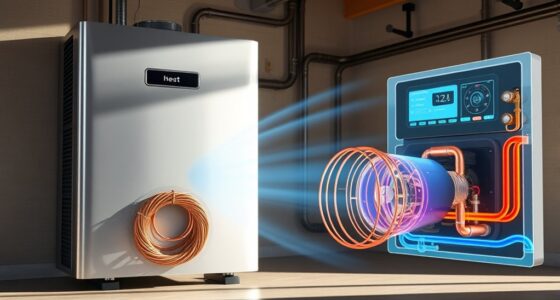Before hiring an appliance repair technician, you need to know a few critical specs. First, check for proper licensing and certification to guarantee compliance with industry standards. It's also important to verify that the technician has insurance, which protects both you and them during repairs. Ask about their experience, especially with your specific appliance, as this can greatly affect service quality. Don't forget to gather references and check online reviews to gauge reliability. Finally, request detailed cost estimates to avoid surprise charges. Understanding these points will help you make an informed choice, leading to smoother repairs ahead.
Key Takeaways
- Ensure the technician is properly licensed and certified to comply with industry standards and regulations.
- Verify that the technician carries liability insurance for protection during repairs and damages.
- Assess the technician's experience, focusing on their familiarity with your specific appliance brand and model.
- Gather recent references and read online reviews to evaluate the technician's reliability and service quality.
- Request detailed cost estimates upfront, including hourly rates, parts, and any additional fees, to avoid surprises.
Licensing and Certification Requirements
Why is proper licensing so essential for appliance repair services? First off, it guarantees compliance with industry standards and legal requirements. When you hire appliance repair technicians, you want to know they're qualified.
Licensing varies by state, often requiring education, training, and experience, plus passing an exam. This protects you from subpar repairs that could lead to more costly issues down the line.
Moreover, many manufacturers require specific certifications for their appliances. Certified technicians are authorized to perform repairs on certain brands, assuring they're using the right parts and techniques.
For instance, if your repair involves refrigerants, the technician must have the EPA Section 608 Technician Certification. This certification is critical as it confirms they understand how to handle refrigerants safely and legally.
Hiring an unlicensed technician might save you money upfront, but it could void your appliance's warranty and expose you to legal issues.
Always check for proper licensing and technician certification before allowing anyone to repair your appliances. Your peace of mind and the longevity of your appliances depend on it.
Importance of Insurance Coverage

When hiring appliance repair services, insurance coverage plays a key role in protecting both you and the technician during the repair process. Requesting proof of insurance guarantees that the repair service has adequate liability insurance, which reflects their professionalism and commitment to customer safety.
Moreover, reputable technicians often provide effective preventive maintenance strategies to minimize risks during repairs. Without proper insurance, you could be held liable for any damages or injuries that occur during the repairs, leading to significant financial repercussions.
Reputable appliance repair services typically carry liability insurance, providing you with peace of mind knowing that you're protected against unforeseen accidents. Verifying insurance coverage is essential in the hiring process, demonstrating the technician's accountability and adherence to industry standards.
It shows that they take their work seriously and are prepared for any potential issues that may arise.
Evaluating Technician Experience

Evaluating a technician's experience is vital to ensuring your appliance gets the best possible care. Start by inquiring about their specific experience with the type of appliance needing repair. Specialized knowledge can greatly impact the quality of service you receive.
Technicians with several years in the industry are often better equipped to diagnose and resolve appliance issues accurately, leading to more effective repairs.
Look for an appliance repair technician who's diverse experience across multiple brands and types of appliances. This breadth of knowledge enhances troubleshooting capabilities, which is important when dealing with complex problems.
Additionally, ask for information on any certifications or training programs the technician has completed. These credentials can indicate a commitment to professional development and expertise in their field.
Gathering References and Reviews

After evaluating a technician's experience, gathering references and reviews becomes the next logical step in your selection process. Start by requesting at least two recent references from potential appliance repair technicians. This helps assess their reliability and service quality.
Don't hesitate to contact those references; ask about the specific work performed, the technician's professionalism, and whether their expectations were met.
Next, explore online reviews. Focus on the overall rating balance; a high number of reviews with ratings between 4.5 to 5 stars typically indicates a reputable appliance repair company.
Look for detailed feedback that highlights the technician's problem-solving abilities and customer service skills. This will help you gauge how well they handle various situations.
Be cautious of overwhelmingly positive or negative reviews, as they may signal potential bias or fake feedback. A mix of both can provide a more accurate picture of the technician's performance.
Understanding Service Costs

Understanding service costs is vital for making informed decisions about appliance repairs. When you're hiring appliance repair services, it's important to request detailed cost estimates from multiple providers. This way, you can compare pricing and guarantee transparency in service fees. Be cautious of unusually low prices; they may indicate subpar service quality or hidden costs.
Typically, the average hourly rate for appliance technicians ranges from $50 to $100, depending on the complexity of the job and the technician's experience. When discussing repair costs, remember to clarify any additional expenses, such as parts and service call fees, upfront. This helps you avoid unexpected charges once the repair is completed.
Reputable services often provide warranties on repairs, which can influence the overall cost but offer added value and assurance of quality work. A warranty can save you money in the long run, making sure that if issues arise after the repair, you won't have to bear the burden of additional costs.
Frequently Asked Questions
What Is the Description of a Appliance Repair Technician?
An appliance repair technician diagnoses and fixes issues with household and commercial appliances. They possess strong mechanical skills, problem-solving abilities, and communicate effectively with clients, ensuring your appliances run smoothly and efficiently after repairs.
What Is Your Process for Deciding if an Appliance Should Be Replaced or Repaired?
When weighing whether to repair or replace, think of it like a dance. You assess age, repair costs, and energy efficiency. If repairs exceed half the replacement cost, it's time to say goodbye and embrace something new.
What Is the Business Code for Appliance Repair?
The business code for appliance repair is 811412. This code encompasses services that maintain and repair household and commercial appliances. It's essential to check this code when hiring to guarantee proper qualifications.
What Should You Do Before Fixing an Electrical Appliance?
Before fixing an electrical appliance, unplug it to avoid shocks. Check the user manual for tips, inspect for visible damage, guarantee components match voltage, and use a multimeter to confirm power is off.
Conclusion
So, before you hire an appliance repair technician, remember these essential specs. You might find it surprising that a well-licensed expert with solid insurance can save you from future headaches. Just imagine stumbling upon a technician who not only meets all your criteria but also comes highly recommended by someone you trust. By taking the time to evaluate their experience and service costs, you'll guarantee your appliances get the care they deserve—and maybe even discover a hidden gem!









